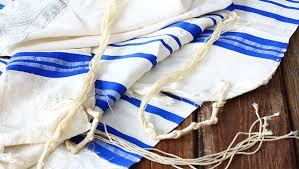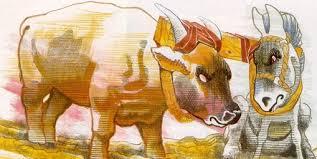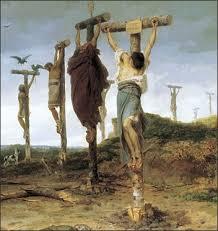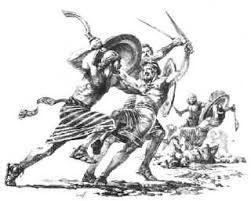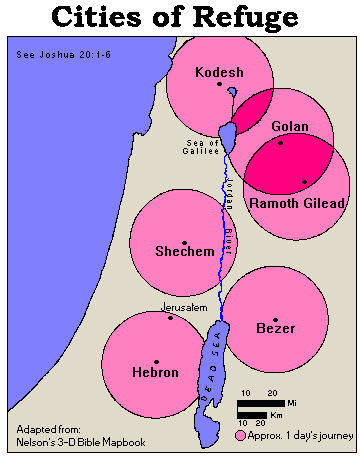Ee – No Dirty Money 23: 17-18
No Dirty Money
23: 17-18
No dirty money DIG: What nations practiced temple prostitution? What was its purpose? Why did God forbid the Israelites to practice it? What was the real effect of ritual prostitution? How was the use of money that had been acquired by sinful means hypocritical?
REFLECT: This is a world-wide problem, but how is the problem of sex-trade affecting your community? Your marriage? Your family? Your place of worship? Who do you know who practices evil, but thinks that good may come of it? How can you pray for them?
The Israelites were not to practice evil so that good may come of it.
Deuteronomy 19:1 to 26:15 (to see link click Dl – The Social and Family Mitzvot) deals with individual mitzvot, and to today’s readers they might appear irrelevant at first, but the very principles behind these commandments were the ones that have brought dignity to mankind. We need to examine these mitzvot in depth to discover the spirit in which they were given, so that we can still live in obedience to God’s Word today. For example, in Numbers 18, the Israelites were to bring their tithes to the Tabernacle because the priests and Levites had no inheritance. But today we have no Temple and no priesthood; however, we bring our tithes to our place of worship. That is the spirit of the mitzvah.

From 23:15 to 26:15, Moses deals with twenty real life situations that the nation would need to function in a godly manner, and valuable lessons for us today as well: number two.
Temple prostitution was common in the religions of the ancient Near East. Cult prostitutes, both male and female, were a feature of the religion practiced by the peoples of Canaan (see the commentary on Genesis Je – Judah Recognized His Seal and Staff and said: She is More Righteous Than I). “Worshippers” felt that they could communicate with the deity only by ritual actions that portrayed what they wanted the god to do. Since Ba’al was, like almost all ancient deities, a fertility god, the act of human intercourse demonstrated that they wanted to multiply their crop (seed). The opposition to the practice was in keeping with Deuteronomy’s rejection of all forms of Canaanite worship, and especially the association of sexuality with the deity.503 The Torah forbid prostitution in general (Leviticus 19:29), and this mitzvah prohibits it in the context of worship. Therefore, YHVH commanded that no Israelite man or woman was to become a shrine prostitute (23:17 NIV).
Furthermore, Moshe declared: You must not bring the earnings of a female prostitute (Hebrew: zovnah, meaning a harlot) or of a male prostitute (Hebrew: kelev, meaning a dog) into the house of ADONAI your God to pay any vow, because ADONAI your God detests them both (23:18 NIV). When a vow was to be paid to YHVH, it was not as though He needed the money; the payment reflected an attitude of gratitude for God’s gracious provision. Israelites were not to pay promised offerings to the Temple with money obtained from this sinful practice.504
This mitzvah implies that the money earned by temple prostitutes was supposed to be used for the maintenance of the Temple and the priests. But God was saying that earnings derived from prostitution was unacceptable: All her images will be smashed, all her prostitute’s pay burned with fire, and all her idols I will make desolate. For from the prostitute’s pay she collected them and to the prostitute’s pay they will return (Micah 1:7). Supposedly the earnings of temple prostitutes were then given back to God’s holy Temple as “temple gifts.” But since prostitution itself was illegal, the money could not be brought to the House of God. It was, in effect, “dirty money.” No wonder it was detestable to ADONAI.
Unfortunately, the history of Isra’el is full of examples of her failure to keep this mitzvah (First Kings 14:24, 15:12, 22:46; Second Kings 23:7; Hosea 4:14). The real effect of temple prostitution on the nation only served to erode the family, the morals of society in general, and eventually led to the Babylon captivity (see the commentary on Jeremiah Gu – Seventy Years of Imperial Babylonian Rule).
Dear Heavenly Father, Praise You that You are perfectly holy. Praise You that holiness to You is much more than outward appearances. The attitude of the heart is what You judge. Yeshua clearly states that adultery can be committed not only by outward physical action; but adultery is also committed by the heart. Though many people nowadays would claim to be righteous by having no involvement in the sex trade, yet Yeshua would ask them, “How is the feelings of your heart when you see a woman?” You have heard that it was said, “You shall not commit adultery.” But I tell you that everyone who looks upon a woman to lust after her has already committed adultery with her in his heart (Matthew 5:27-28).
Praise You that Your Holy Ruach lives in all believers (Romans 8:9) and He is always there to help and to guide so You win the temptation battle . No temptation has taken hold of you except what is common to mankind. But God is faithful – He will not allow you to be tempted beyond what you can handle. But with the temptation He will also provide a way of escape, so you will be able to endure it (First Corinthians 10:13). Thank You for being such a wonderful Father and for always being with Your children. For God Himself has said, “I will never leave you or forsake you,” (Hebrews 13:5c). In Yeshua’s holy name and His power of resurrection. Amen






